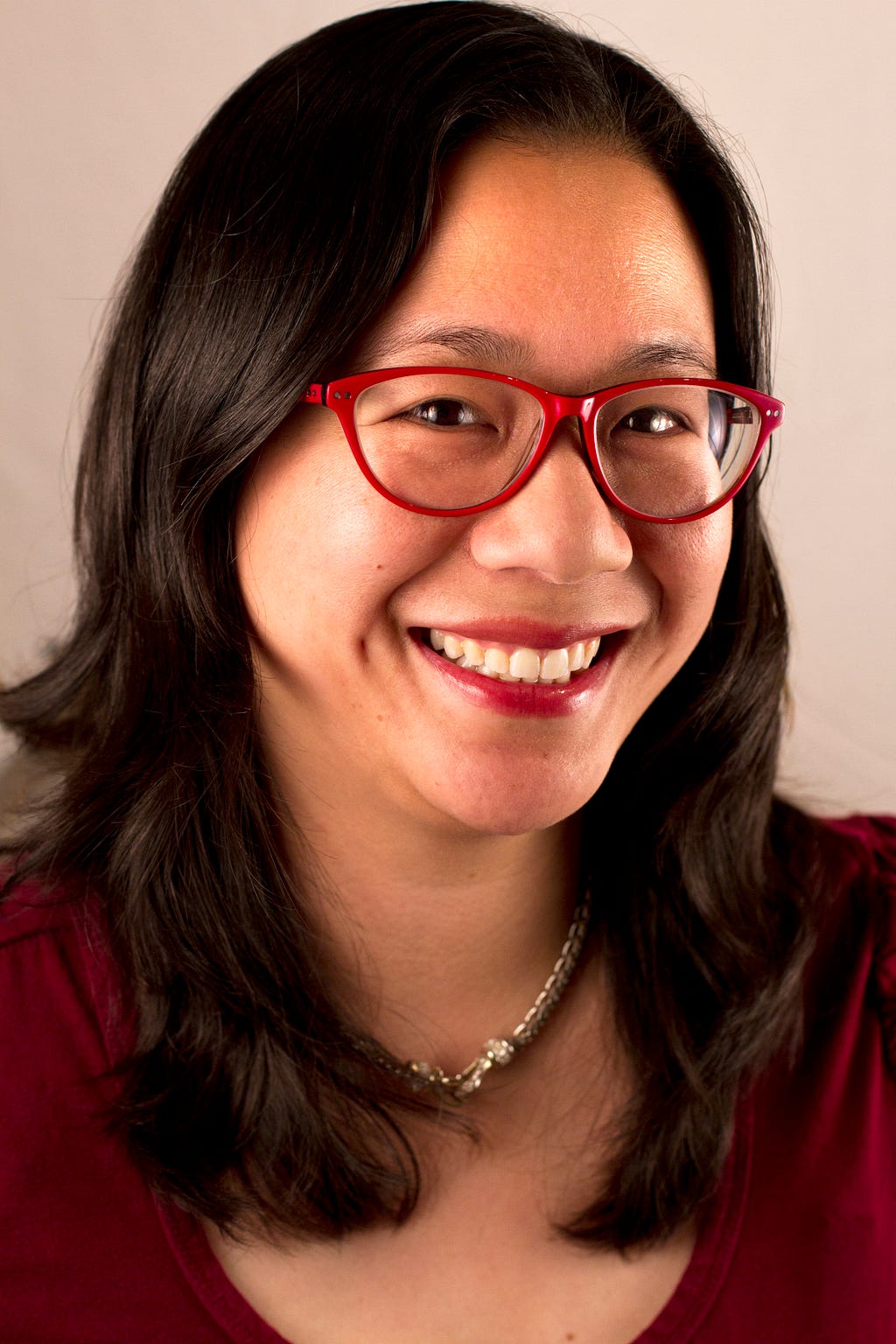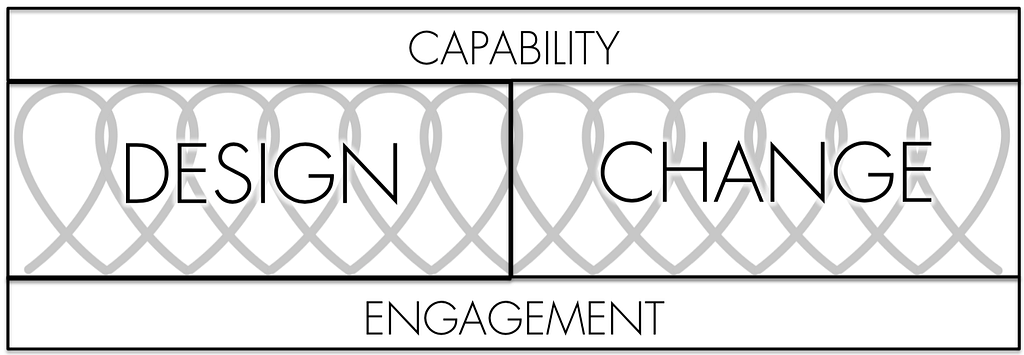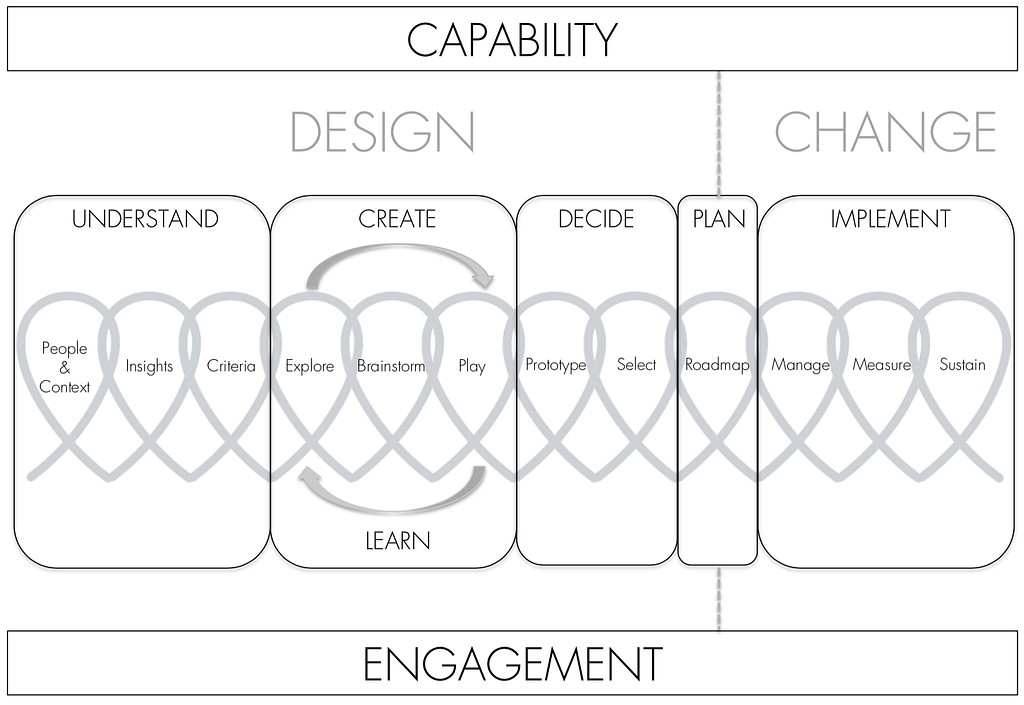An Interview with Karen Jaw-Madson and Fotis Georgiadis

My big idea is Design of Work Experience (DOWE), the much needed step-by-step “how to” for designing, implementing and sustaining culture and aligned employee experiences at work. This interdisciplinary concept applies innovation where it’s really needed: the workplace. There are too many toxic environments that breed employee burnout and business risk. Company culture is often a liability due to neglect. It causes scandals and fires CEOs. It is my mission to equip organizations with the tools they need to make culture a differentiating asset, one where both people and business thrive. We shouldn’t have to live with mediocrity that wastes potential and possibility. Design of Work Experience HAS to change the world for the better because we need it to.
As a part of my series about “Big Ideas That Might Change The World In The Next Few Years” I had the pleasure of interviewing Karen Jaw-Madson. Karen is principal of Co.-Design of Work Experience and author of Culture Your Culture: Innovating Experiences @ Work (Emerald Group Publishing, 2018). She enables organizations with innovative approaches for intimidating leadership challenges, creating conditions for lasting change that maximizes performance. A former corporate executive, Karen is known as a versatile leader across multiple industries with experience developing, leading, and implementing numerous organizational initiatives around the globe. She was featured in Inc., Fast Company, Fortune, Thrive Global, as well as contributed to HR publications such as SHRM’s HR People + Strategy, TLNT.com, HR.com’s HR Strategy & Planning Excellence magazine, and HR Professional magazine. Karen has a BA in Ethnic and Cultural Studies from Bryn Mawr College and a MA in Social-Organizational Psychology from Columbia University.
Thank you so much for joining us, Karen! Can you tell us a story about what brought you to this specific career path?
Culture has always been a part of my life. As a child of immigrants, I had experiences that made me wonder, even then, why things were the way they were. I studied culture as an undergrad. My graduate studies allowed me to explore culture at work. When it came to my professional career, it took one conversation. I was on the path to pursue life in academia when a management consultant my employer worked with pulled me aside. He felt that I could really make a difference in business environments. “You could go back anytime,” he said, “…and I see you really making an impact.” Somehow he knew that having a positive effect was my biggest motivator. He set me on a path that took me from non-profit program management to human resources to management consultant and author.
Can you share the most interesting story that happened to you since you began your career?
That’s hard to answer. To be honest, the most interesting experiences in my life are not career-oriented, but personal. I suppose if we were having drinks and sharing stories from work I would tell you about the time I was called into an office where an employee was suffering from drug-induced paranoia and I had to talk him into coming to the on-site medical clinic with me. Or the time the police came to arrest a department manager and I had to get her to come over to my office so it wouldn’t happen in front of her employees. Or when I terminated someone’s employment and they hugged me. Or having to do a work call while watching a parade. The common thread among all of these is that they happened the way they happened because people put their trust in me.
Which principles or philosophies have guided your life? Your career?
If you asked anyone that knows me well, they would say I’m highly principled, and everything I do is driven by my values. I already mentioned two of them: having a positive impact, and engendering trust. Being authentic is another. Helping others is one I am continuously managing because sometimes I do it to my own detriment. And a surprising one might be what I call dignity — no matter what I do, I should be able to look myself in the mirror and be proud of what I see. It’s a little different than self-esteem, though that’s important too. These are probably at the top of the list. I determine the importance of these values by imagining how devastated I would be if I were peceived to be the opposite: not making a difference or having a negative impact, being untrustworthy, unhelpful, and inauthentic, and not liking what I see in my actions. As for philosophies, I will take a page from a leader I admire with my own version: “faith, family, and work — in that order.”
Ok. Let’s now move to the main focus of our interview. Can you tell us about your “Big Idea That Might Change The World”?
My big idea is Design of Work Experience (DOWE), the much needed step-by-step “how to” for designing, implementing and sustaining culture and aligned employee experiences at work. This interdisciplinary concept applies innovation where it’s really needed: the workplace. There are too many toxic environments that breed employee burnout and business risk. Company culture is often a liability due to neglect. It causes scandals and fires CEOs. It is my mission to equip organizations with the tools they need to make culture a differentiating asset, one where both people and business thrive. We shouldn’t have to live with mediocrity that wastes potential and possibility. Design of Work Experience HAS to change the world for the better because we need it to.

DOWE is made up of four main components: DESIGN and CHANGE processes enabled by ENGAGEMENT of employees and development and use of CAPABILITIES throughout.

There are 5 phases: UNDERSTAND, CREATE & LEARN, DECIDE, PLAN, and IMPLEMENT, organized as a series of iterative learning loops, each with its own specific set of activities. My book, Culture Your Culture: Innovating Experiences @ Work, walks through the framework in great detail.
How do you think this will change the world?
There’s a lot out there that describes archetypes of what makes culture good or bad, and even more that talks about “how we did it.” Design of Work Experience actually builds the capability of culture change and provides solutions that are customized for every company’s unique context. No more force-fitting so called “best practices” or going through the motions by trial and error. We need to create a network effect where there’s more companies that care about their employees, the cultures they work in, and their social impact than not. Startups should be intentionally building culture from the ground up beginning with the founding team. Established organizations should be continuously transforming to the best versions of themselves.
Keeping “Black Mirror” and the “Law of Unintended Consequences” in mind, can you see any potential drawbacks about this idea that people should think more deeply about?
Engaging people in culture change is not something that can be partially done. You have to be “all in.”
Starting the work and not finishing it, or going back to old ways breeds distrust. That’s probably the most likely negative scenario. I also talk about the caveats and potential pitfalls with DOWE in the book — mostly due to people’s shortcomings. The worst thing that could happen is that DOWE is used to manipulate employees and intentionally create toxic cultures. That already happens enough on it’s own and perverting this well-intentioned framework would be another violation.
Was there a “tipping point” that led you to this idea? Can you tell us that story?
I actually share DOWE’s origin story in the book as well. The short version is that I led a team to develop a global talent management strategy using design thinking for the first time. When I saw the degree of engagement from both leadership and employees throughout the initiative, I realized two things: 1) This was a journey the organization had to take with us in order to be ready for real change and 2) A user-centered experience mindset was what was missing in HR all these years.
This experience moved me to such a degree that it led to my career change. I had the opportunity to further refine this practice, share it through my book, and (of course) make a difference.
What do you need to lead this idea to widespread adoption?
Honestly? I need more Board of Directors, CEOs and their CHROs willing to invest in talent and culture, not just talk about it. Their employees and customers are hungry for this type of engagement. Instead, I see a troubling trend where professional wordsmiths (i.e. PR and communications firms) are being hired to help companies articulate cultural aspirations with their website copy and other branding materials in lieu of really working on their culture.
The other thing I need for widespread adoption is help with getting my life’s work in front of leaders who already “get it.” As a person of color, I feel my experiences uniquely qualify me to see culture from a different perspective, and I have worked all of my adult life to academically and professionally earn my qualifications and demonstrate my worthiness to do this work. And yet, it’s hard to be heard with all the noise out there, and I still come up against people who — against better judgment — still need more “proof.” That’s why I so very much appreciate this opportunity to talk with you and share my work.
What are your “5 Things I Wish Someone Told Me Before I Started” and why. (Please share a story or example for each.)
I learned these equally important lessons over the years:
1. Do what you can, and let go of what you can’t control. I spent many years trying to will the world to go my way, and discovered it’s a losing battle — I’m talking to you, fellow ENTJs! I should’ve spent less time being bothered by what I couldn’t affect and more time on what I could. I finally realized this when I began working on design thinking, intuition, improvisation, and my spirituality all around the same time. Every one of these concepts require a certain degree of letting go, focusing on what’s being offered, and working with it — even through failure. As counterintuitive as it sounds, it’s very empowering. Funny that Disney’s “Let it Go” came out the very year I struck out on my own as a consultant in 2013. That really solidified it for me!
2. No job is ever worth sacrificing your health and your relationships. This was a hard lesson for me to learn, and it brought me to the point of burnout. I was working up to 70 hours a week in an international role that required both frequent travel and super early/super late meetings. My health and my personal relationships suffered greatly and I had nothing left to give. All I could do was try and survive. This is not how we are meant to live. No job or company — no matter how great — is worth it. You’ll never get your time back and the company will never fully reciprocate. My life and my work are now full of the meaning that I somehow lost along the way.
3. Stress is a true test of your character. If you want to know who a person really is, just watch the choices they make in stressful situations. I saw people change for the worse in a toxic work environment. They did bad things in the name of self-preservation. They became paranoid. They were mean. They broke promises. Having observed this, I vowed to remain authentic and values-driven. I made it my personal challenge to do well in this environment. I told myself, “If I could succeed here, I could succeed anywhere.” I was promoted twice and left on my own terms.
4. Your identity and your values will ground you. I realized that I can avoid getting lost through the twists and turns of life if I hold on to “my who and my how”. It took years to figure this out. Back in grad school, one of the projects assigned was to create a physical object to represent our identity. I made an Alexander Calder inspired, multi-tiered, kinetic mobile that was constantly balacing individual aspects of my identity at the time: woman of color, daughter, sister, friend, professional, student, Christian, fiance. I added a few more since then. Being secure in my sense of self and my values helps me to make decisions and guides the direction of my life.
5. Make ambiguity your friend and trust the journey. We will never have enough information or guarantees we need or want in life. When you combine this with what’s out of our control, there will always be ambiguity. It took much effort, but I learned that if I don’t accept ambiguity, then I’m trading it for fear of the unknown. Without ambiguity, I wouldn’t have left my corporate executive career to become an author and consultant. We wouldn’t be having this conversation today. Ambiguity is more of a frenemy. I don’t love it, but I have to be ok with it.
If I may, I want to offer one more as a bonus. Cultivate your network before you need it. People are less inclined to help if they only hear from you while you’re job searching or need something from them. You know the type. Relationships go two-ways, so do your best to give more than you take. I have a group of people I see at least a few times a year, and I touch base with others at least twice a year. I also use social media, e-mail, texts, and phone calls as a way of keeping in touch. Most people will be there for you if you are there for them.
Can you share with our readers what you think are the most important “success habits” or “success mindsets”?
Let me start with mindset. You may have heard this before, but I believe that success is self-defined and based on one’s own ambitions. My idea of success may be different than yours. For me, it’s having opportunities to choose from — getting to pick what I work on and who I work with to make a difference without having to worry. A long time ago someone told me not to focus on job security, but career security. That great advice shifted my mindset.
I also think that sometimes success is not what we think or plan it to be. If we are open minded and make the effort to reflect, we can be successful even when we fail. Finally, I will reiterate that values and identity should remain steadfast no matter what happens. So that’s my mindset — -define your own success, focus on career security, be open to the unexpected, and stick with who you are and how you are.
One habit I would encourage is persistence. I have a stubborn streak because I learned that things don’t always come easy for me and as a result I am that much more grateful for my blessings. Take, for example, my book. When I couldn’t convince literary agents to take me on as an unknown first time author, I went to the publishers directly. More rejections. And when I finally signed with my first publisher, things did not go well for a long time. It got to a point where I had to hire a lawyer to negotiate me out of the contract so I could sign with a new (and thankfully better) publisher. 18 months after my book launch, I am still in what they call the hard part — promoting it. This journey started in 2014, and it still continues. It’s not that persistence gets rewarded — that doesn’t always happen. It’s that persistence tested and revealed my commitment. As much as I wish things were easier, persistence built my character and contributes to my success.
The other day I saw a post somewhere in social media that said something like, “If you don’t try, the answer will always be no.” Always try for what you want. If you really want it, keep trying.
Some very well known VCs read this column. If you had 60 seconds to make a pitch to a VC, what would you say? He or she might just see this if we tag them 🙂
Wonderful! So we all know leadership isn’t easy. In startups, it’s a whole different challenge. Founders are ousted every day because stakeholders “lose confidence” in their ability to lead (think WeWork, Uber, and so on). The reality is that entrepreneurs don’t always have access to the tools and support they need to be successful. They make unnecessary mistakes. Toxic cultures are seeded early on and blow up with the company. I hope to change that. Recently, I began pitching around my next book project as a part-time Executive-In-Residence with a VC firm to focus on leadership, organization, and culture. It’s hard enough for startups to survive. People dynamics shouldn’t subtract from or even lose an investor’s chance for ROI. It should do the opposite. I’m looking for the right partners that find value in offering my expertise to their portfolio of companies for my research. Please send me new referrals and meetings!
How can our readers follow you on social media?
I’m on a number of social media platforms and would love engagement from your readers.
Website: www.designofworkexperience.com
Twitter: @karenjaw
Facebook: /designofworkexperience
Instagram:co.designofworkexp
LinkedIn: /company/co — /
Thank you so much for joining us. This was very inspirational.
Thank you! I appreciated this opportunity to share!
Big Ideas That Might Change The World: “How We Can Design A Much Better Work Experience” was originally published in Authority Magazine on Medium, where people are continuing the conversation by highlighting and responding to this story.



